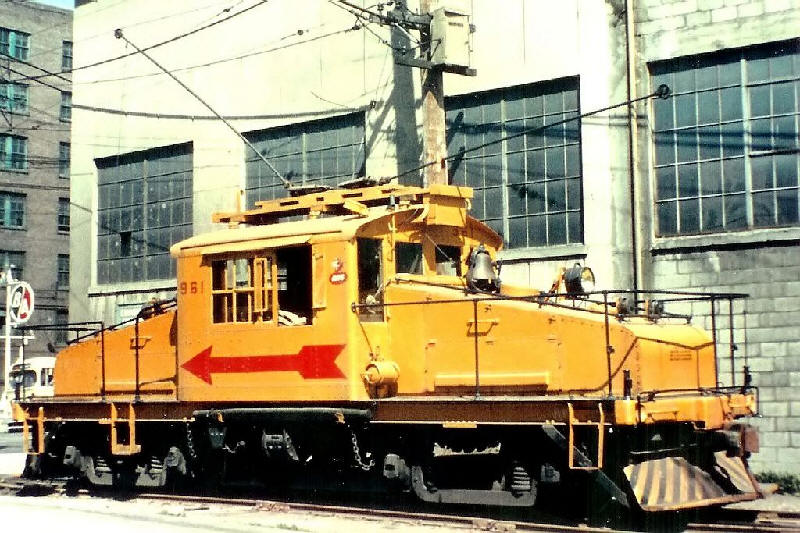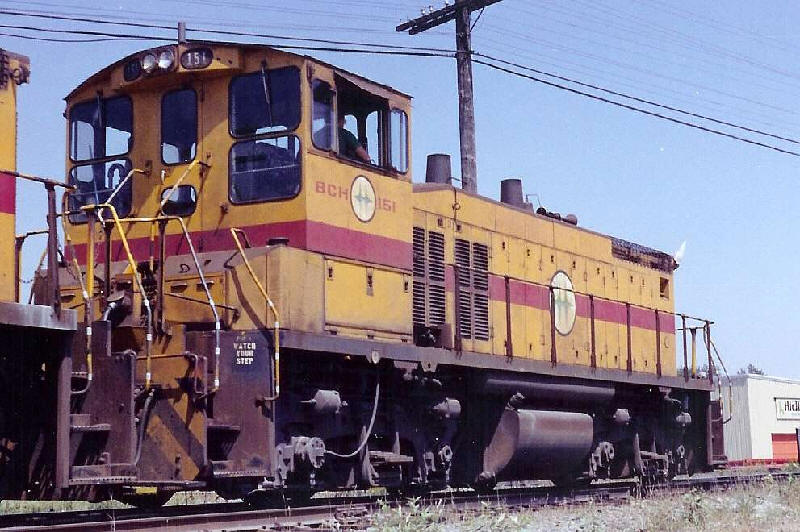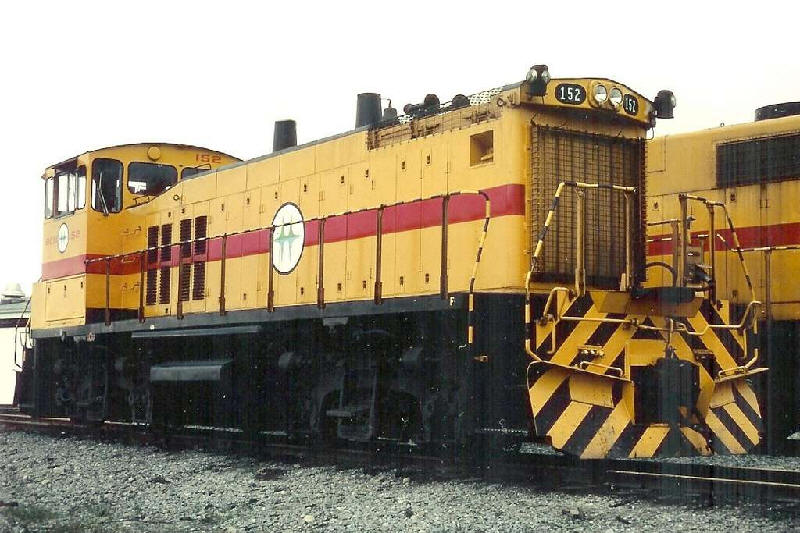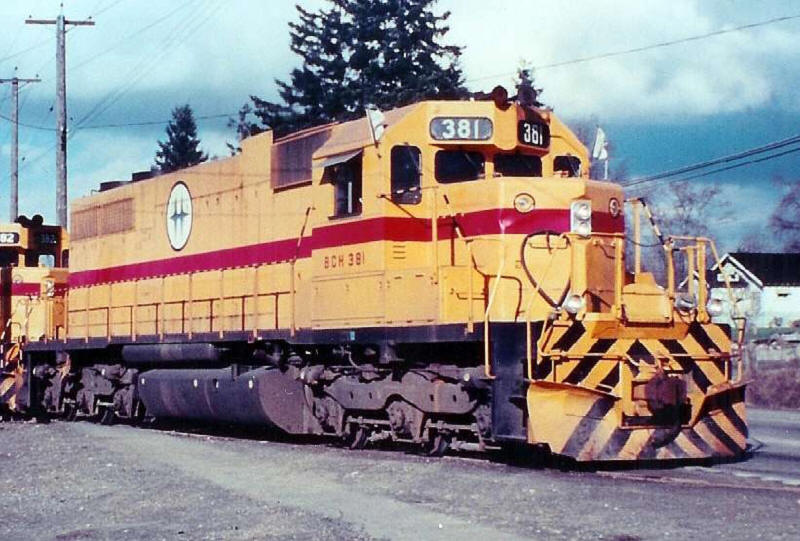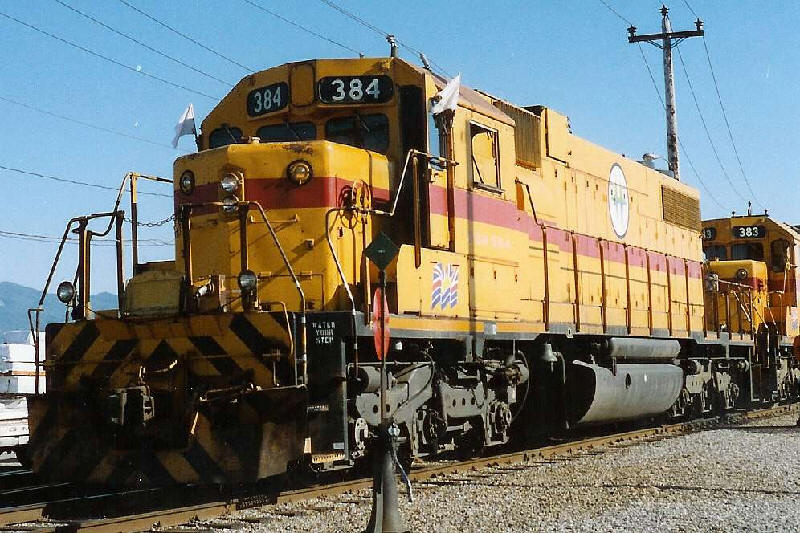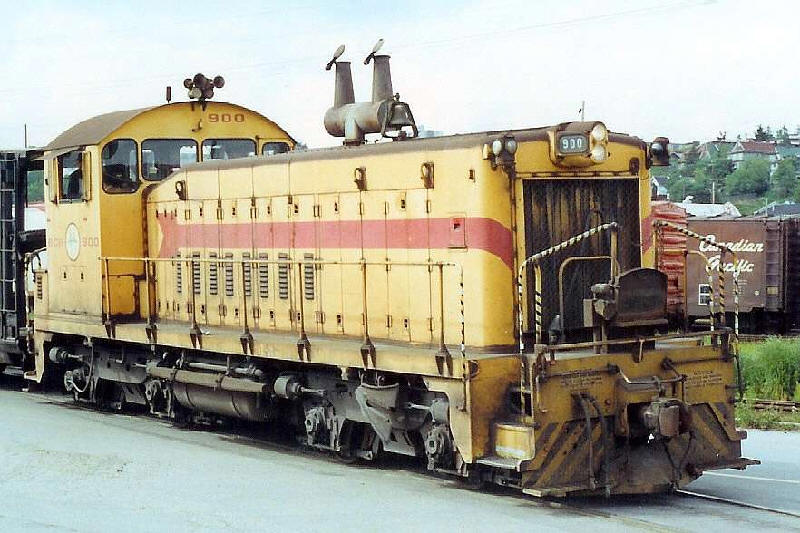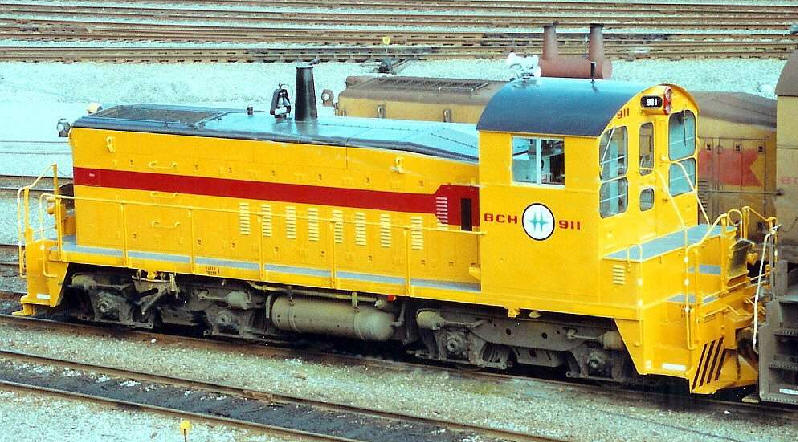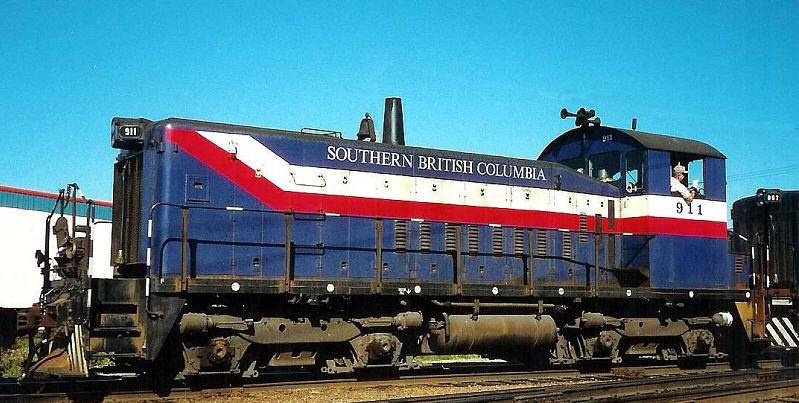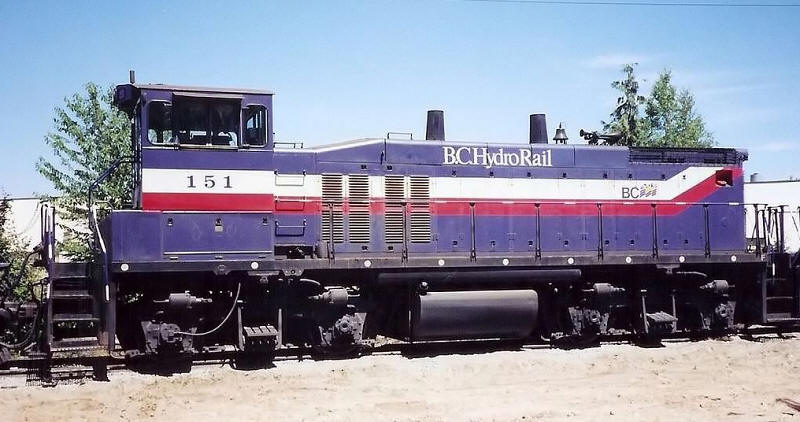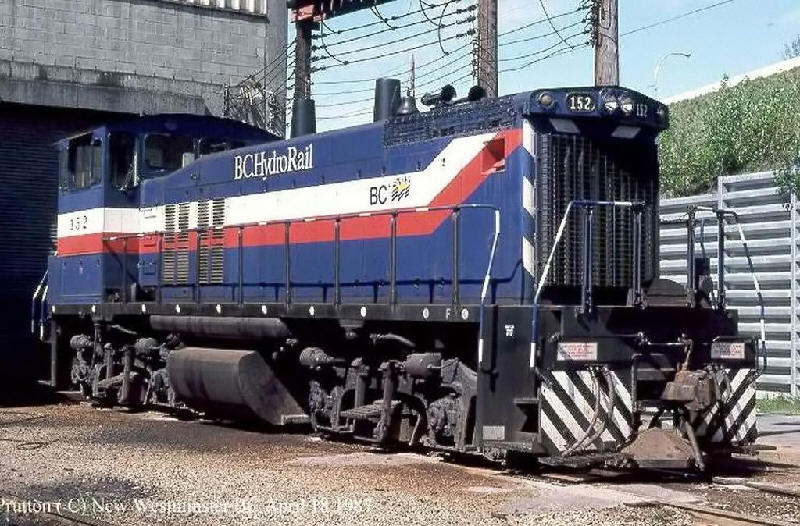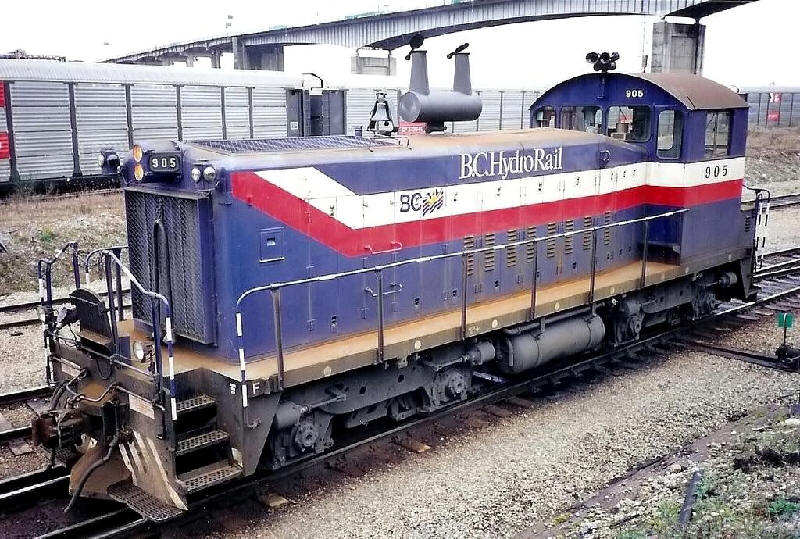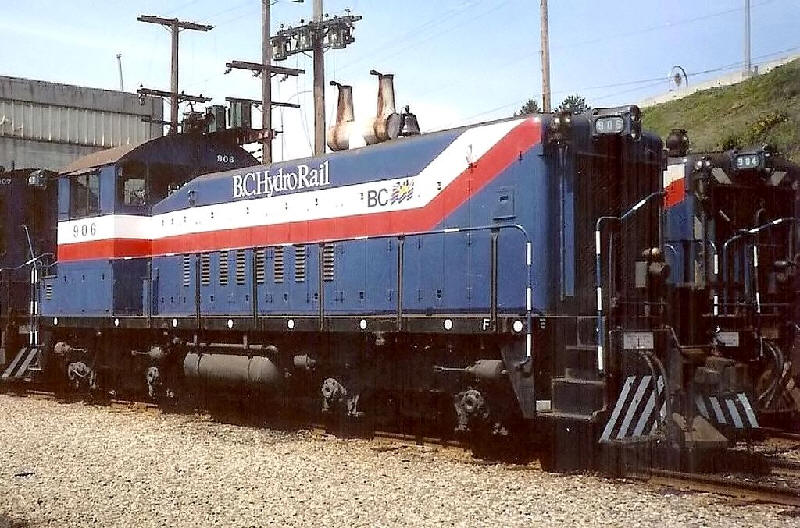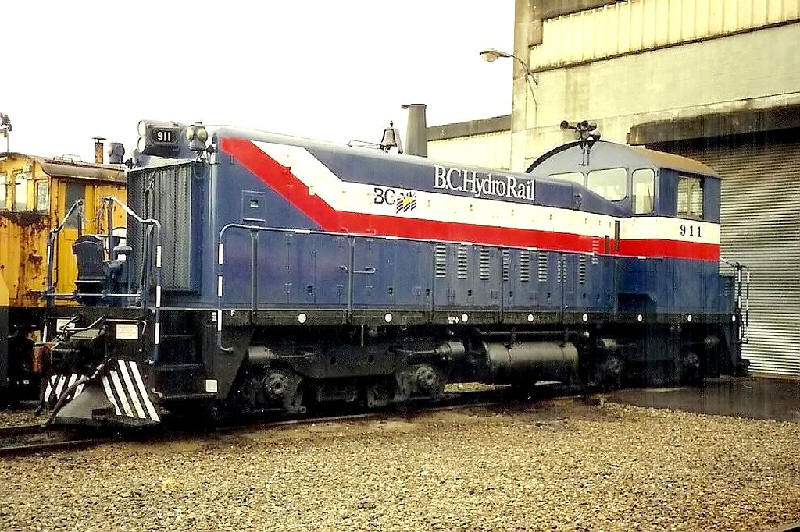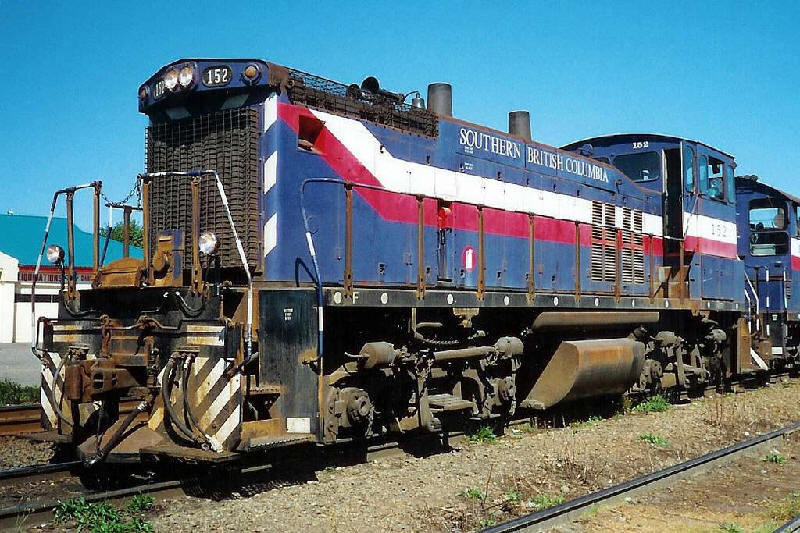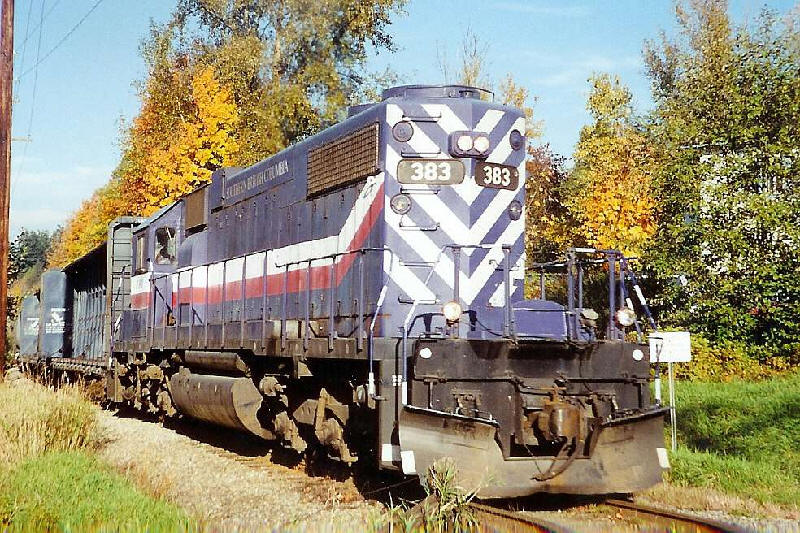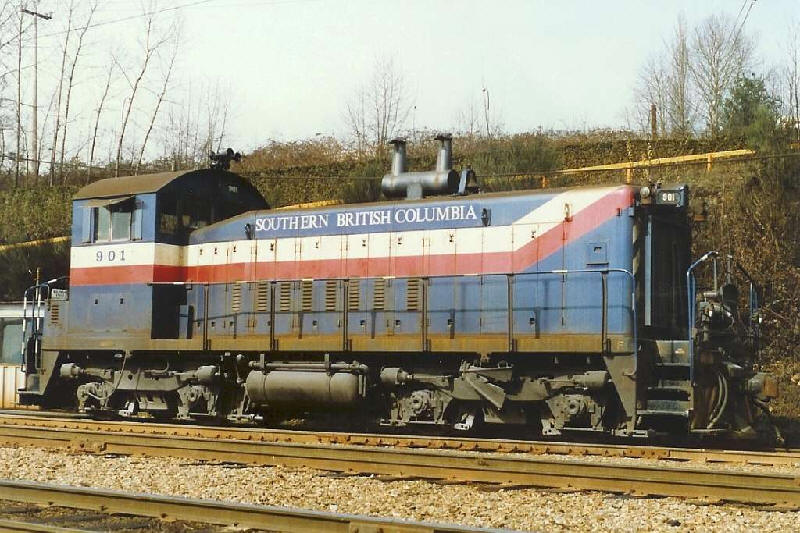 |
|||||
|
In the past three years, the CRO covered the BC RAIL Story over 10 issues. They were the biggest BC shortline with the former BCE, BC Hydro and Southern BC being second largest. The other BC shortlines are the Kelowna Pacific and Okanagan Valley Railways in the Vernon, BC which may be covered in future issues. This report will cover BCE and BC Hydro and The Southern Railway of BC.
A very brief history on the BCER. Iíll be concentrating on the BCE Freight Locomotives in this part of the report that survived into the BC Hydro Railway era.
The BC Electric Railway was established back in the mid 1890ís.
The BCER operated Public Transportation in its early years.
Streetcar systems operated in Vancouver, New Westminster, North Vancouver and Victoria. The BCER ran interurban trams along three lines between Vancouver and New Westminster (via Burnaby), as well as between Vancouver and Richmond, New Westminster and Chilliwack, and the third on Vancouver Island between Victoria and North Saanich. During and after the streetcar era, BC Electric also ran bus and trolleybus systems in Greater Vancouver and Greater Victoria; these systems subsequently became part of BC Transit. Trolley buses still run in Greater Vancouver, but disappeared from Vancouver Island by 1952.
Some of the more recent freight power on the BCE included three GE/Alco Electrics acquired in 1946 from Oregon Electric. They were built for the OE back in 1912 as the #21, #22 & #23. The BCE renumbered these locos as the #961, #960 & #962 respectfully.
The BCE #960 was restored by the West Coast Railway Association and is located at their Museum in Squamish, BC. The #961 was sold to Edmonton Transit in 1980, (The following link has a photo of former BCE #961 as Edmonton Transit #2001)
The #962 was scrapped way back in 1959.
The BCE also bought four GE 70 Tonner switchers in 1949. These would be numbered #940 to #943. The #940 & #942 were both sold to Weyerhaeuser (In Springfield, Ore) in 1983. The #941 & #943 would be sold to Eurocan Pulp & Paper (in Kitimat, BC) in 1980 & 1977 respectfully.
The BCE also bought 9 new GMD SW900RS road switchers between 1955 and 1958. These locos would be numbered in the #900 to #908 series. All of these SW900RS units still remain today on the SRY Rail Link roster. Also, all of the SW900 units on the railway were equipped with Flexicoil trucks for better handling while on mainline service.
BCE #900 in this photo appears to be at New Westminster, BC to me, unknown date and photographer. Photo: Mark Forseille Collection.
BCE #941 at the West Coast Railway Association Museum in Squamish, BC on January 29th, 2000. Photo by: Mark Forseille.
BCE #961 at Vancouver, BC. Date and photographer unknown. Note the B/A gas station sign at the left in the photo. Mid to late 50ís perhaps?
Photo: Mark Forseille Collection.
Below shows photos of two restored BC Electric Trolleys. BCER 1207 and 1231 in operation
BCER #1231 and BCER #1207 (both photos) taken on August 13th, 2006 in Vancouver, BC.
These two Interurban cars ran between Science World and Grandville Island before the Olympic Village was constructed. The Cars are operated by the local TRAMS group of Volunteers South of False Creek in Vancouver. BC. A must ride when the Interurban cars are to return to the rails again in August 2010.
For more information on the run dates and new future route expansion see the TRAMS (Transit Museum Society) website link below.
If youíd like to check out more history on the BCE. Hereís a couple of websites that Iíd suggest that you check out for additional photos and information on the BCE in general.
http://www.davesrailpix.com/bcer/bc.htm
In 1961, the provincial government took over BC Electric, with the railway becoming a division of the Crown Corporation BC Hydro. Between 1964 and 1969, the BC Hydro would buy three more GMD SW900 units. They would be numbered the #909. #910 & #911. The 910 and 911 would have one major difference being at 1,000 HP, and be classed as SW900. The BCH bought one lone GMD SW900 from the Mainland of Manitoba in September 1969. It became the BC Hydro #931. The #931 was eventually sold to MacMillian Bloedel in 1987 for their pulp mill in Powell River, BC. In October 1971, the BC Hydro would purchase its first six axle locomotive from EMD in LaGrange, Ill. It would be an SD38AC and was numbered the #381. In December 1972, the railway would purchase two more big units from EMD, this time they were SD38-2's. They would be numbered the #382 and #383. One last SD38-2 would be added to the roster in August 1974. This unit would be numbered the #384. In November 1975, the railway was once again taking delivery of some new power. They bought three MP15DCís from EMD. The MP15ís would be numbered the #151, #152 & #153. BCH #151 in the late 1970ís is heading from New Westminster, BC on a detour as the Fraser River Bridge was out of service. The #151 leads the Valley Train for Huntingdon and has gained clearance to pass by the CP yard in Port Coquitlam, BC. Photo by; Ray Humphries.
BCH #152 at New Westminster, BC on March 3rd, 1977. Photo: Norman Shapland Collection.
BCH #381 at Surrey, BC Date and Photographer unknown. Photo: Mark Forseille Collection.
BCH #384 at Huntingdon, BC in the late 1970ís. Photo by: Ray Humphries.
BCH #900 at New Westminster, BC in May 1982. Photo by: Mike Coles.
BCH #903 at New Westminster, BC in October 1987. Photographer unknown. Mark Forseille Collection.
BCH #911 captured after a fresh repainting at the shops in New Westminster, BC. Photo by: Mike Coles in May 1983.
BCH #931 the lone SW900 is also at the shops in New Westminster, BC in April 1984. Photo by: Mike Coles.
BCH #942 at Vancouver, BC on March 27th, 1977. Photo by: Claude Prutton.
In 1985/86 the BC Hydro Railway changed their paint scheme from my favorite old yellow with a red stripe to the new paint scheme thatís mainly blue with red and white striping. BCH #151 at New Westminster, BC in September 1987. Photo by: Mark Forseille.
BCH #151 (Side photo) at Surrey, BC while on a work train attending the wreck clean up of the 381 and 383 in June 1987. Photo by: Mark Forseille.
BCH #152 at New Westminster, BC April 18th, 1987. Photo by: Claude Prutton.
BCH #382 with her extra flags flowing in the wind at New Westminster, BC in May 1987. Photo by: Mark Forseille.
BCH #383 at the shops in New Westminster, BC showing the effects of a derailment back in June 1987. The 383 waits her turn to be repaired from the wreck. The 381 was the other unit involved in the same mishap. Photo by: Mark Forseille in October 1987.
BCH #905 switching the BCH yard at New Westminster, BC in January 1988. Photo by: Mark Forseille.
BCH #906 at the shops in New Westminster, BC in May 1988. Photo by: Mark Forseille.
BCH #907 at New Westminster, BC in October 1987. Photo by: Mark Forseille.
BCH #910 at the shops in New Westminster, BC in October 1987. Photo by: Mark Forseille.
BCH #911 is also at the shops in New Westminster, BC in October 1987. Photo by: Mark Forseille.
In 1989, BC Hydro sold the railway to the ITEL Rail Group. This shortline operator renamed the railway as the Southern Railway of British Columbia (SRY). The last BC Hydro paint scheme was kept by ITEL. Only the name was changed that youíll notice on the locomotives. SRY #152 at Chilliwack, BC in September 1995. Photo by: Mark Forseille.
SRY #153 at New Westminster, BC on Sept 17th, 1989. Photo by: Douglas Sanford.
SRY #381 at New Westminster, BC on May 7th, 1999. Photo by: Mark Forseille.
SRY #382 at the shops in New Westminster, BC on June 22nd, 1998. Photo by: Mark Forseille.
SRY #383 a rare photo running long hood forward up Scott Road Hill crossing 104th Ave in Surrey, BC on Halloween Day 1996. Photo by: Mark Forseille.
SRY #901 at New Westminster, BC on March 20th, 1989. Photo by: Douglas Sanford.
SRY #903 at New Westminster, BC in April 1990. Photo by: Mark Forseille.
SRY #904 at New Westminster, BC in October 1992. Photo by: Douglas Sanford.
SRY #909 at Huntingdon, BC on May 24th, 1997. Photo by: Mark Forseille.
SRY #911 at Huntingdon, BC in August 1995. Photo by: Mark Forseille.
In 1994 it was bought by the Washington Group but kept the SRY name. Soon after, the locomotive fleet would be repainted as other Washington Group railroads are and be known as the SRY Rail Link. Some additional information on the BC Electric and BC Hydro Railways. The line was originally built in 1910 as the British Columbia Electric Railway (BCER), an interurban trolley service for passengers (until 1950) as well as for freight such as farm produce. To this day BC Hydro retains the right to reintroduce passenger service. In recent years, with congestion and growing environmental concerns, there has been increasing demand for this service, and willingness to pay, from persons wishing to travel among Fraser Valley communities other than by private automobile. Part of the Vancouver Skytrain Expo Line follows the right-of-way of BCER's former Central Park Line through Burnaby to New Westminster. The Burnaby Lake line's right-of-way is largely taken up by the Trans-Canada Highway but sections of it survive as walking and biking power line trails. The route of the Stave Falls Branch along Hayward Lake is also now a walking trail managed by BC Hydro and the District of Mission, with sections of it south of Ruskin Dam used as local power line and neighborhood walking trails. The Southern Railway of British Columbia (SRY) now operates the railway here in the southwestern mainland of British Columbia. The main facility is the port at Annacis Island with major import of cars, export of forestry products, and other shipments. The railway has interconnections with three Class I railroads, including Canadian Pacific, Canadian National and BNSF. It operates a fleet of 29 locomotives and 2,000 cars, and hauls approximately 70,000 carloads per year over its 123 miles of track, 62 miles of it are mainline track. I will be covering the SRY Rail Link in my next part of BC Shortlines.
Special Thanks to Douglas Sanford, Mike Coles, Norman Shapland, Claude Prutton and to my late Friend Ray Humphries for supplying some of their great photos for this article. Reference information for this article obtained from The Canadian Trackside Guide, BCER TRAMS website and Wikipedia (BC Electric Railway History) Mark Forseille Port Coquitlam, BC Canada.
| |||||
 |
|||||
|
© CRO 2012 |




